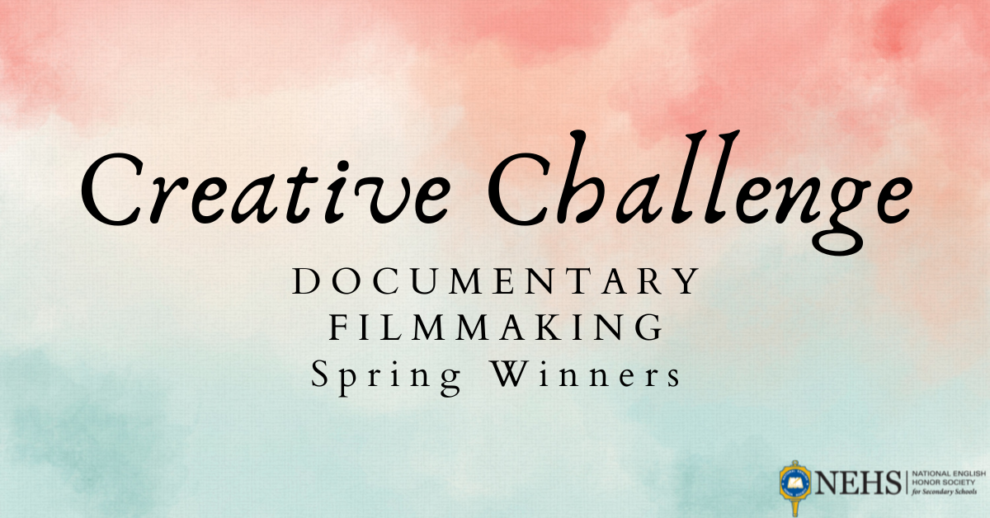NEHS has spent the year working closely with Journeys in Film to widen student access to documentary filmmaking opportunities, to encourage teachers to incorporate documentary filmmaking into their classrooms, and to engage with students interested in film as a story-telling medium. Our documentary filmmaking competition focused on the efforts being made by organizations to improve literacy within student members’ local communities.
The NEHS evaluation team was happy to receive submissions for the Spring Creative Challenge: Documentary Filmmaking from all over the world and had a very difficult time selecting the three winners. After lots of debate and discussion, we were happy to name films from PrepaTec Eugenio Garza Sada in Mexico, the International School of Kigali in Rwanda, and Allen D. Nease High School in Florida, USA, as the winners. Evaluators of all three films were impressed with the compelling nature of each, the quality of production, and the positive messages that are shared.
Why Hate Reading When You Can Love It?
PrepaTec Eugenio Garza Sada, Mexico
In Why Hate Reading When You Can Love It? Alonzo Bacco takes us on a personal journey from a disdain for reading to a newfound appreciation. This was catalyzed by an unexpected encounter with a book fair in northern Mexico. The documentary focuses on the systemic issues surrounding literacy in Mexico, where reading is often perceived as an obligation rather than a source of entertainment.
Our documentary’s social impact campaign seeks to tackle these problems head-on by utilizing the transforming potential of storytelling and community involvement. We intend to increase the film’s audience and motivate people to take action to restore reading as a valued cultural practice by employing focused tactics. Our social impact campaign aims to increase the documentary’s accessibility for younger viewers, thereby inspiring them to interact with its themes and take a fresh look at the world of books. We want to directly engage teens and start a dialogue on the value of literature in our lives by showing the movie in high school settings and posting it on our NEHS group’s social media accounts.
Through collaboration with community groups, educational institutions, and cultural centers, we plan to host documentary screenings in marginalized communities and lead conversations centered around the film’s topics. These film screenings will act as stimulants for discussion and introspection, inviting viewers to share their personal reading experiences and consider strategies for promoting literacy in their local communities.
In addition, our campaign will make use of digital media to spread the movie’s reach beyond of conventional theaters. We will interact with audiences online by using social media platforms strategically to share interesting excerpts from the documentary and invite viewers to participate in the discussion by using certain hashtags. To spread our message and inspire a larger audience, we will also work with influential people and thought leaders in the literary world.
Our social impact campaign’s core goal is to empower budding writers and young readers. We will create additional educational resources motivated by the documentary by collaborating with academic institutions and literacy initiatives. These materials will include reading lists and discussion guides chosen by professionals. In addition to improving the viewing experience, these resources will give parents and teachers practical methods for fostering a love of reading in the next generation. My intention in sharing this story is to demonstrate that, despite our backgrounds and origins, we can all get over our prejudices and appreciate the beauty of reading. We ask young readers to accompany us on this journey of self-discovery and empowerment through conversations, films, and online interaction.
To sum up, Why Hate Reading When You Can Love It? is a call to action to reconsider the place of reading in our society, not just a documentary. We hope to spark a grassroots movement that honors the wonders of books and promotes a culture of continuous learning and inquiry through our social impact campaign.
 Alonzo Bacco Salinas, a junior at PrepaTec Eugenio Garza Sada, Monterrey, Mexico, serves as Marketing Director of the NEHS chapter. He sees literature as a conduit for sharing stories and finds cinema to be the ultimate medium for emotional connection. It is his favorite form of artistic expression. He wants to be a filmmaker and live doing what he loves most: creating stories. Passionate about exploring diverse narratives, Alonzo believes in the power of both written and visual art forms to evoke profound emotions and foster empathy.
Alonzo Bacco Salinas, a junior at PrepaTec Eugenio Garza Sada, Monterrey, Mexico, serves as Marketing Director of the NEHS chapter. He sees literature as a conduit for sharing stories and finds cinema to be the ultimate medium for emotional connection. It is his favorite form of artistic expression. He wants to be a filmmaker and live doing what he loves most: creating stories. Passionate about exploring diverse narratives, Alonzo believes in the power of both written and visual art forms to evoke profound emotions and foster empathy.
 Manuel Alejandro Martínez Morales is a junior at PrepaTec Eugenio Garza Sada in Monterrey, Mexico, and is currently the Vice President of the NEHS chapter at his high school. He views literature not merely as a means for expressing oneself through a text, but also as a way of conveying emotions, unveiling new horizons, and immersing oneself within complex worlds and realities. For him, literature plays a pivotal role in shaping individuals.
Manuel Alejandro Martínez Morales is a junior at PrepaTec Eugenio Garza Sada in Monterrey, Mexico, and is currently the Vice President of the NEHS chapter at his high school. He views literature not merely as a means for expressing oneself through a text, but also as a way of conveying emotions, unveiling new horizons, and immersing oneself within complex worlds and realities. For him, literature plays a pivotal role in shaping individuals.
 Frida Victoria Navarro Sánchez lives in Monterrey, Nuevo Leon. When she was little, Frida discovered the world of books and felt the joy of immersing herself in it, whether exploring imaginative fiction or the depths of nonfiction. As she continues her educational journey at PrepaTec Eugenio Garza Sada, she remains committed to the search for knowledge, taking each opportunity to expand her horizons and contribute meaningfully to the world around her.
Frida Victoria Navarro Sánchez lives in Monterrey, Nuevo Leon. When she was little, Frida discovered the world of books and felt the joy of immersing herself in it, whether exploring imaginative fiction or the depths of nonfiction. As she continues her educational journey at PrepaTec Eugenio Garza Sada, she remains committed to the search for knowledge, taking each opportunity to expand her horizons and contribute meaningfully to the world around her.
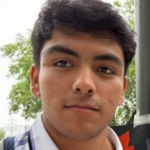 Arturo Guerrero Solórzano is a student at PrepaTec Eugenio Garza in Monterrey, Mexico. He is currently the Social Responsibility Director of the NEHS chapter in his high school. For him literature is a way of expressing different individual perspectives that can contribute to the construction of knowledge.
Arturo Guerrero Solórzano is a student at PrepaTec Eugenio Garza in Monterrey, Mexico. He is currently the Social Responsibility Director of the NEHS chapter in his high school. For him literature is a way of expressing different individual perspectives that can contribute to the construction of knowledge.
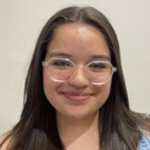 Dayra Montalvo, a student at PrepaTec Eugenio Garza in Monterrey, Mexico, has a vibrant and sociable personality, and is eager to share her endeavors with others. She actively seeks out opportunities to foster positive change in the world. Alongside this, she indulges in spreading interest in literature through diverse mediums and activities. Exploring new contexts and spearheading social initiatives are among her leisure pursuits.
Dayra Montalvo, a student at PrepaTec Eugenio Garza in Monterrey, Mexico, has a vibrant and sociable personality, and is eager to share her endeavors with others. She actively seeks out opportunities to foster positive change in the world. Alongside this, she indulges in spreading interest in literature through diverse mediums and activities. Exploring new contexts and spearheading social initiatives are among her leisure pursuits.
 Andrea Isabel Morales Valdez resides in Monterrey, Nuevo León, Mexico. Currently, she is a high school student at PrepaTec Eugenio Garza Sada. She enjoys learning about classic authors and reading contemporary literature. Her love for fantasy books was born when she discovered the Harry Potter saga. However, her greatest passion in life is dancing.
Andrea Isabel Morales Valdez resides in Monterrey, Nuevo León, Mexico. Currently, she is a high school student at PrepaTec Eugenio Garza Sada. She enjoys learning about classic authors and reading contemporary literature. Her love for fantasy books was born when she discovered the Harry Potter saga. However, her greatest passion in life is dancing.
Pages of Hope: Empowering Communities through Literacy
International School of Kigali, Rwanda
Constant effort and hard work have created an economic powerhouse in the heart of Africa, and while this is to be applauded, there are still issues to be resolved on a community level. Rwanda’s literacy rate of 75.9% has been growing steadily over the decades but is still significantly lower than its East-African neighbors of Tanzania and Uganda. This can be attributed to several different factors: one of the most significant is the limited access to affordable books throughout the capital, Kigali. This has significant impacts on the average income population, and mostly affects younger generations of children who have an increasingly difficult time acquiring literacy skills.
Our belief is that with big issues, come a collection of small-scale solutions. To spotlight this, our film focuses on Patchwork Second-Hand Books, which leads a meaningful project to increase book availability in the capital. By watching our film, we hope to inspire our local community to the fact that all changes can be significant and that it does not take much to start to address an overwhelming task, such as increasing Rwanda’s literacy rate.
To achieve a larger audience, our team will display the film at our school assembly in May, as it is Get Caught Reading Month. By doing this, we especially wish to inspire the younger grades in elementary school. In our wider community, however, we want to publish our short film on social media, in order to easily share our message with more people. Our message is important, both nationally and internationally, and thus we hope to be able to share our film with NEHS chapters all over the world so that they can be inspired to tackle a large-scale issue through small-scale solutions. Every book in every bookstore contains pages of hope.
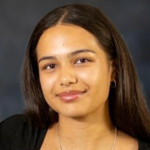 Tara Dorji Ritsma is from Bhutan and the Netherlands. She is currently in 10th grade and the President of the National English Honor Society chapter at the International School of Kigali, Rwanda. She has always had a strong love for reading, starting from a really young age when her parents read to her before she slept. Ever since then, she has continued to explore different genres and expand her passion for reading and even writing! Making this documentary was a great opportunity to shine a spotlight on her country of residence, and she is looking forward to seeing the impact of her hard work!
Tara Dorji Ritsma is from Bhutan and the Netherlands. She is currently in 10th grade and the President of the National English Honor Society chapter at the International School of Kigali, Rwanda. She has always had a strong love for reading, starting from a really young age when her parents read to her before she slept. Ever since then, she has continued to explore different genres and expand her passion for reading and even writing! Making this documentary was a great opportunity to shine a spotlight on her country of residence, and she is looking forward to seeing the impact of her hard work!
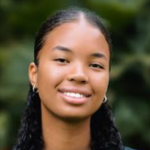 Nora Kadiatou Diarrassouba is from Germany and has roots in the Ivory Coast as well as South Korea. She is currently a sophomore in high school, and the Public Relations Chair and the Activities Chair of the National English Honor Society chapter at the International School Kigali, in Rwanda. She has developed a passion for reading because her parents read out loud to her every night. Reading is something that connects her with her friends and family. She associates reading with happiness but also with resolving and explaining conflict. In her opinion, the exchange of literacy is an opportunity to grow, understand, and bring down barriers.
Nora Kadiatou Diarrassouba is from Germany and has roots in the Ivory Coast as well as South Korea. She is currently a sophomore in high school, and the Public Relations Chair and the Activities Chair of the National English Honor Society chapter at the International School Kigali, in Rwanda. She has developed a passion for reading because her parents read out loud to her every night. Reading is something that connects her with her friends and family. She associates reading with happiness but also with resolving and explaining conflict. In her opinion, the exchange of literacy is an opportunity to grow, understand, and bring down barriers.
Enlightened Minds: Empowering Literacy at Nease High School
Allen D. Nease High School, Florida
This documentary film is a call to action as much as it is a story. We are dedicated to starting a social media platform to extend the Nease literacy program.
Our primary reason for creating this documentary was to increase the number of advocates for the program and show widespread passion for literacy. By working with our school’s television communication department, we aimed to promote literacy around local communities of Nease High School.
Utilizing social media platforms and digital marking strategies, we can and will share content to promote our film and spark conversations about literacy. Also, by using social media, we aim to reach diverse audiences and invite them to engage in our program.
Partnering with local schools, libraries, and local literacy organizations, we will host screenings of our documentary and create events to create conversation and collaboration within the community. These events will serve and act as platforms for discussion and action, empowering those who attend to take steps toward supporting literacy initiatives.
Additionally, by developing educational resources such as discussion guides and lesson plans, we will equip educators with the tools needed to use our film as a catalyst for classroom discussions about literacy. Through increased awareness, advocacy, and support for literacy invites, we hope to create a ripple effect of positive change within Nease High School and the surrounding communities, empowering their full potential through the power of reading and writing.
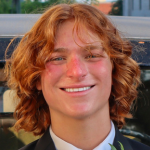 John Wozniak, an 11th-grade student at Nease High School in St. Augustine, FL, brings his passion for literature and filmmaking together in a fascinating documentary. His storytelling illuminates the significance of literacy initiatives within the community. Advocating for education’s transformative potential, John sparks inspiration, urging others to explore literacy. He brings creativity and passion to his team, striving to start impactful conversations and catalyze positive societal shifts and break societal norms. Through his work, John not only showcases the power of literacy but also initiates actionable change, illustrating the profound influence of storytelling on shaping perceptions and fostering progress within Nease High School and the surrounding communities.
John Wozniak, an 11th-grade student at Nease High School in St. Augustine, FL, brings his passion for literature and filmmaking together in a fascinating documentary. His storytelling illuminates the significance of literacy initiatives within the community. Advocating for education’s transformative potential, John sparks inspiration, urging others to explore literacy. He brings creativity and passion to his team, striving to start impactful conversations and catalyze positive societal shifts and break societal norms. Through his work, John not only showcases the power of literacy but also initiates actionable change, illustrating the profound influence of storytelling on shaping perceptions and fostering progress within Nease High School and the surrounding communities.


